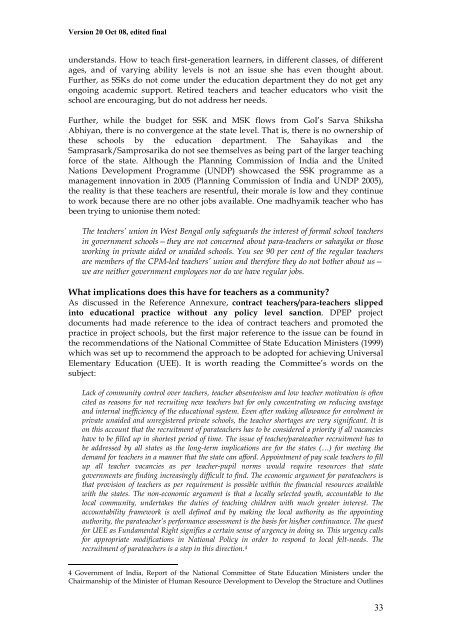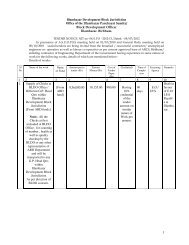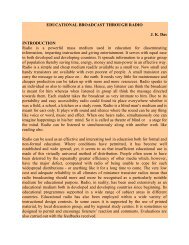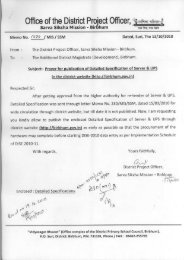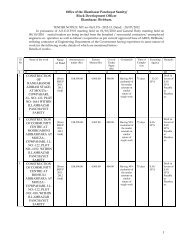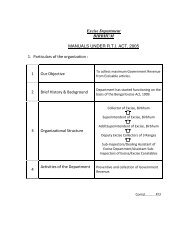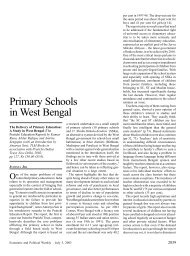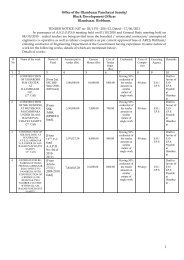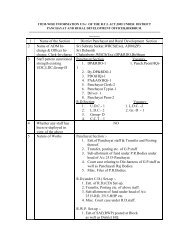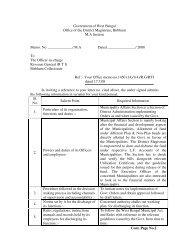primary school teachers the twists and turns of ... - ERU Consultants
primary school teachers the twists and turns of ... - ERU Consultants
primary school teachers the twists and turns of ... - ERU Consultants
Create successful ePaper yourself
Turn your PDF publications into a flip-book with our unique Google optimized e-Paper software.
Version 20 Oct 08, edited finalunderst<strong>and</strong>s. How to teach first-generation learners, in different classes, <strong>of</strong> differentages, <strong>and</strong> <strong>of</strong> varying ability levels is not an issue she has even thought about.Fur<strong>the</strong>r, as SSKs do not come under <strong>the</strong> education department <strong>the</strong>y do not get anyongoing academic support. Retired <strong>teachers</strong> <strong>and</strong> teacher educators who visit <strong>the</strong><strong>school</strong> are encouraging, but do not address her needs.Fur<strong>the</strong>r, while <strong>the</strong> budget for SSK <strong>and</strong> MSK flows from GoI’s Sarva ShikshaAbhiyan, <strong>the</strong>re is no convergence at <strong>the</strong> state level. That is, <strong>the</strong>re is no ownership <strong>of</strong><strong>the</strong>se <strong>school</strong>s by <strong>the</strong> education department. The Sahayikas <strong>and</strong> <strong>the</strong>Samprasark/Samprosarika do not see <strong>the</strong>mselves as being part <strong>of</strong> <strong>the</strong> larger teachingforce <strong>of</strong> <strong>the</strong> state. Although <strong>the</strong> Planning Commission <strong>of</strong> India <strong>and</strong> <strong>the</strong> UnitedNations Development Programme (UNDP) showcased <strong>the</strong> SSK programme as amanagement innovation in 2005 (Planning Commission <strong>of</strong> India <strong>and</strong> UNDP 2005),<strong>the</strong> reality is that <strong>the</strong>se <strong>teachers</strong> are resentful, <strong>the</strong>ir morale is low <strong>and</strong> <strong>the</strong>y continueto work because <strong>the</strong>re are no o<strong>the</strong>r jobs available. One madhyamik teacher who hasbeen trying to unionise <strong>the</strong>m noted:The <strong>teachers</strong>’ union in West Bengal only safeguards <strong>the</strong> interest <strong>of</strong> formal <strong>school</strong> <strong>teachers</strong>in government <strong>school</strong>s—<strong>the</strong>y are not concerned about para-<strong>teachers</strong> or sahayika or thoseworking in private aided or unaided <strong>school</strong>s. You see 90 per cent <strong>of</strong> <strong>the</strong> regular <strong>teachers</strong>are members <strong>of</strong> <strong>the</strong> CPM-led <strong>teachers</strong>’ union <strong>and</strong> <strong>the</strong>refore <strong>the</strong>y do not bo<strong>the</strong>r about us—we are nei<strong>the</strong>r government employees nor do we have regular jobs.What implications does this have for <strong>teachers</strong> as a community?As discussed in <strong>the</strong> Reference Annexure, contract <strong>teachers</strong>/para-<strong>teachers</strong> slippedinto educational practice without any policy level sanction. DPEP projectdocuments had made reference to <strong>the</strong> idea <strong>of</strong> contract <strong>teachers</strong> <strong>and</strong> promoted <strong>the</strong>practice in project <strong>school</strong>s, but <strong>the</strong> first major reference to <strong>the</strong> issue can be found in<strong>the</strong> recommendations <strong>of</strong> <strong>the</strong> National Committee <strong>of</strong> State Education Ministers (1999)which was set up to recommend <strong>the</strong> approach to be adopted for achieving UniversalElementary Education (UEE). It is worth reading <strong>the</strong> Committee’s words on <strong>the</strong>subject:Lack <strong>of</strong> community control over <strong>teachers</strong>, teacher absenteeism <strong>and</strong> low teacher motivation is <strong>of</strong>tencited as reasons for not recruiting new <strong>teachers</strong> but for only concentrating on reducing wastage<strong>and</strong> internal inefficiency <strong>of</strong> <strong>the</strong> educational system. Even after making allowance for enrolment inprivate unaided <strong>and</strong> unregistered private <strong>school</strong>s, <strong>the</strong> teacher shortages are very significant. It ison this account that <strong>the</strong> recruitment <strong>of</strong> para<strong>teachers</strong> has to be considered a priority if all vacancieshave to be filled up in shortest period <strong>of</strong> time. The issue <strong>of</strong> teacher/parateacher recruitment has tobe addressed by all states as <strong>the</strong> long-term implications are for <strong>the</strong> states (…) for meeting <strong>the</strong>dem<strong>and</strong> for <strong>teachers</strong> in a manner that <strong>the</strong> state can afford. Appointment <strong>of</strong> pay scale <strong>teachers</strong> to fillup all teacher vacancies as per teacher-pupil norms would require resources that stategovernments are finding increasingly difficult to find. The economic argument for para<strong>teachers</strong> isthat provision <strong>of</strong> <strong>teachers</strong> as per requirement is possible within <strong>the</strong> financial resources availablewith <strong>the</strong> states. The non-economic argument is that a locally selected youth, accountable to <strong>the</strong>local community, undertakes <strong>the</strong> duties <strong>of</strong> teaching children with much greater interest. Theaccountability framework is well defined <strong>and</strong> by making <strong>the</strong> local authority as <strong>the</strong> appointingauthority, <strong>the</strong> parateacher’s performance assessment is <strong>the</strong> basis for his/her continuance. The questfor UEE as Fundamental Right signifies a certain sense <strong>of</strong> urgency in doing so. This urgency callsfor appropriate modifications in National Policy in order to respond to local felt-needs. Therecruitment <strong>of</strong> para<strong>teachers</strong> is a step in this direction. 44 Government <strong>of</strong> India, Report <strong>of</strong> <strong>the</strong> National Committee <strong>of</strong> State Education Ministers under <strong>the</strong>Chairmanship <strong>of</strong> <strong>the</strong> Minister <strong>of</strong> Human Resource Development to Develop <strong>the</strong> Structure <strong>and</strong> Outlines33


